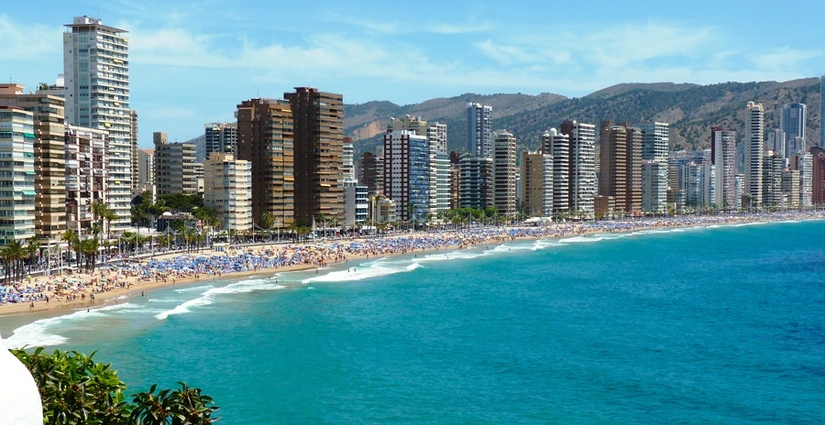Since tourism leisure spread, the coast has always been a powerful attraction for tourists. The east coast and, by extension, Benidorm has a long history of over one hundred years of relationship with tourism, which is why today has a large infrastructure ready for the many visitors who continually receives. Campings in Benidorm, apartment complexes, hotel, the wide range of daytime and evening entertainment … an entire infrastructure to serve the tourist.
The custom of “taking baths” perhaps copied from the wealthy and renowned families of Europe that used to travel to Baden Baden or Biarritz, is one of the first manifestations of tourism of which there is evidence in Benidorm.
The first known tourist brochure dating from 1893 in Benidorm is about the Baths of Virgin of Suffrage. At this time visitors came to the coast to take advantage of the medicinal and healing properties of sea water baths, which were so popular in Europe.
And that is how the tourist history of Benidorm begins…
Infrastructures, key in the history of tourism in Benidorm
As in many other attractive areas for visitors, tourism development in Benidorm is accompanied by the construction of infrastructure, especially roads. During the early years of the twentieth century the Silla-Alicante road opens, which improves communication with Benidorm, and, above all, the arrival of the railroad to Alicante occurs.
In 1914 the narrow gauge railroad, the Trenet of the Marina, links Alicante with Altea, Benidorm, and Villajoyosa and, shortly after, Denia. The arrival of the train makes the first collective movements of tourists appear; the so-called “train jug”, which transports tourists from Alcoy, Alicante or even from Madrid. The curious name “train of the botijo” starts by the custom of these first tourists of carrying earthenware pitchers with fresh water to bear better the long journey in those slow and uncomfortable trains.
Another infrastructure that contributes to the arrival of mass tourism to Benidorm is the city itself. In 1956 the City Council approved urban planning that directed the city in a definitive way towards tourism. Wide avenues, respect the natural orientation of the beaches, accessibility and vertical growth of the city (hotels, apartments) foster tourism growth that occurs in Benidorm from this decade.
Today Benidorm is “the Manhattan of the Mediterranean”, the town with more skyscrapers per capita in the world, behind only the US city in number of skyscrapers per square meter.
Foreign tourism, the key to growth in Benidorm
With the arrival of foreign tourists…bikinis came too. But, for Franco’s Spain this bath wear was far too provocative. A fine of 40,000 pesetas made the visionary mayor, Pedro Zaragoza, who saw the future of tourism in Benidorm, climb on his Vespa and drive the 400 kilometres to Franco’s residence to ask him to legalize bikinis. The “mayor of the Vespa” got his prize and Benidorm was the first city in Spain in which people could wear bikinis while in the rest of Spain was banned.
The 60’s were the years of the boom of tourism, especially foreign tourism, in Benidorm.
A fully vertical city, specially prepared to welcome visitors, sun, beach and great weather make Benidorm an international tourist centre. During that time the population living in Benidorm multiplied itself, from around 3.000 at the late 50s to over 12.000 in 1970. This increase in the population consists mainly of the large number of tourists coming to the city not only in summer; Benidorm has become a resort town throughout the year.
The Festival of Benidorm, a tourist attraction in itself
Perhaps the most widespread song from the Benidorm Festival is the one of Julio Iglesias in 1968 when he won the competition with the song “La vida sigue igual”, since Iglesias becomes the image of the Festival for the following years. The Spanish Song Festival started in 1959 based on the Festival of San Remo in Italy, its main target was to present Spanish artists. Its stage has hosted stars like Julio Iglesias, the Duo Dinámico or Raphael in those 60s when the Festival had a deserved international reputation.
Nowadays Benidorm is the tourist town par excellence of the Spanish Mediterranean coast. Its mild climate throughout the year, its infrastructure and good communication both by air and land makes it a desired destination by both domestic and foreign tourists looking to enjoy their holidays in Benidorm.
But surely there are some moments in the history of Benidorm that are not popularly known, which one would you highlight in the history of Benidorm?




hiya boo xxx